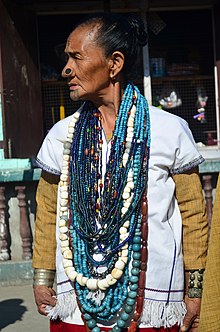Lower Subansiri district
Lower Subansiri district | |
|---|---|
 Paddy fields near Ziro | |
Location in Arunachal Pradesh | |
| Country | |
| State | Arunachal Pradesh |
| Headquarters | Ziro |
| Population (2011) | |
| • Total | 83,030[1] |
| Demographics | |
| • Literacy | 76.3%[1] |
| • Sex ratio | 975[1] |
| Time zone | UTC+05:30 (IST) |
| Website | lowersubansiri |
Lower Subansiri district (Pron:/su:bənˈsɪɹi/) is one of the 25 administrative districts of the state of Arunachal Pradesh in northeastern India.
History
[edit]The district was formed when Subansiri district was bifurcated into Upper and Lower Subansiri districts in 1987.[2] Lower Subansiri district has a long ancient history related with the Chutiya Kingdom. It was probably under Chutiya chieftain rule from a long time, and came under Birpal's rule in the 12th century. In 1999 Papum Pare district was split to form new district,[2] and this was repeated on 1 April 2001, with the creation of Kurung Kumey district.[2]
In October 2017, the state government approved the creation of Kamle district, involving the carving out of Raga, Dolungmukh and Kumpurijio circles from Lower Subansiri district.[3] In 2024, the Keyi Panyor district was formed by carving out 195 villages from Lower Subansiri district.[4]
Geography
[edit]The district headquarters are located at Ziro. The district occupies an area of 3,460 km2.
It is bounded on the north by the Upper Subansiri district of Arunachal, on the south by Papum Pare District of Arunachal Pradesh and Assam, on the east by West Siang district and some part of Upper Subansiri, and on the west by East Kameng district of Arunachal Pradesh.
Divisions
[edit]There are 6 administrative circles in this district, namely, Ziro (Sadar), Yachuli, Pistana, Raga, Kamporijo and Dollungmukh. The district also divided into 3 blocks: Ziro-I, Ziro-II, and Tamen-Raga. [citation needed]
There are 2 Arunachal Pradesh Legislative Assembly constituencies located in this district: Yachuli and Ziro-Hapoli. Both of these are part of Arunachal West Lok Sabha constituency.[5]
Demographics
[edit]
| Year | Pop. | ±% p.a. |
|---|---|---|
| 1961 | 23,950 | — |
| 1971 | 30,823 | +2.56% |
| 1981 | 35,405 | +1.40% |
| 1991 | 43,148 | +2.00% |
| 2001 | 55,726 | +2.59% |
| 2011 | 83,030 | +4.07% |
| source:[6] | ||
According to the 2011 census Lower Subansiri district has a population of 83,030,[7] roughly equal to the nation of Andorra.[8] This gives it a ranking of 623rd in India (out of a total of 640).[7] The district has a population density of 24 inhabitants per square kilometre (62/sq mi) .[7] Its population growth rate over the decade 2001–2011 was 48.65%.[7] Lower Subansiri has a sex ratio of 975 females for every 1000 males,[7] and a literacy rate of 76.33%.[7]
This district is inhabited by Nyishis and Apatanis.
Languages
[edit]Languages used in the district include Apatani, Nyishi language.[9]
Culture
[edit]Major local festivals of the district are Nyokum, Boori-Boot Yullo, and Dree Festival.
Flora and fauna
[edit]In 1995 Lower Subansiri district became home to the Talley Valley Wildlife Sanctuary, which has an area of 337 km2 (130.1 sq mi).[10]
Development
[edit]Gyati Takka General Hospital (GTGH) in Lower Subansiri district has become the first hospital in the state of Arunachal Pradesh to receive support from CHD Group in its effort to build robust health system for the North East Region. [11][12]
References
[edit]- ^ a b c "District Census 2011". Census2011.co.in.
- ^ a b c Law, Gwillim (25 September 2011). "Districts of India". Statoids. Retrieved 11 October 2011.
- ^ "Arunachal Assembly approves Kamle as 23rd district of state". Arunachal24.in. 18 October 2017.
- ^ "Arunachal assembly passes bill to create two new districts". The Week. Retrieved 25 February 2024.
- ^ "Assembly Constituencies allocation w.r.t District and Parliamentary Constituencies". Chief Electoral Officer, Arunachal Pradesh website. Archived from the original on 13 August 2011. Retrieved 21 March 2011.
- ^ Decadal Variation In Population Since 1901
- ^ a b c d e f "District Census 2011". Census2011.co.in. 2011. Retrieved 30 September 2011.
- ^ US Directorate of Intelligence. "Country Comparison:Population". Archived from the original on 13 June 2007. Retrieved 1 October 2011.
198 Andorra 84,825 July 2011 est.
- ^ M. Paul Lewis, ed. (2009). "Apatani: A language of India". Ethnologue: Languages of the World (16th ed.). Dallas, Texas: SIL International. Retrieved 28 September 2011.
- ^ Indian Ministry of Forests and Environment. "Protected areas: Arunachal Pradesh". Archived from the original on 23 August 2011. Retrieved 25 September 2011.
- ^ author (10 November 2023). "GTGH receives equipment under Mission ICU | The Arunachal Times". Retrieved 14 April 2024.
{{cite web}}:|last=has generic name (help) - ^ "Arunachal: GTGH becomes first hospital to receive Mission ICU equipment". 9 November 2023. Retrieved 14 April 2024.

